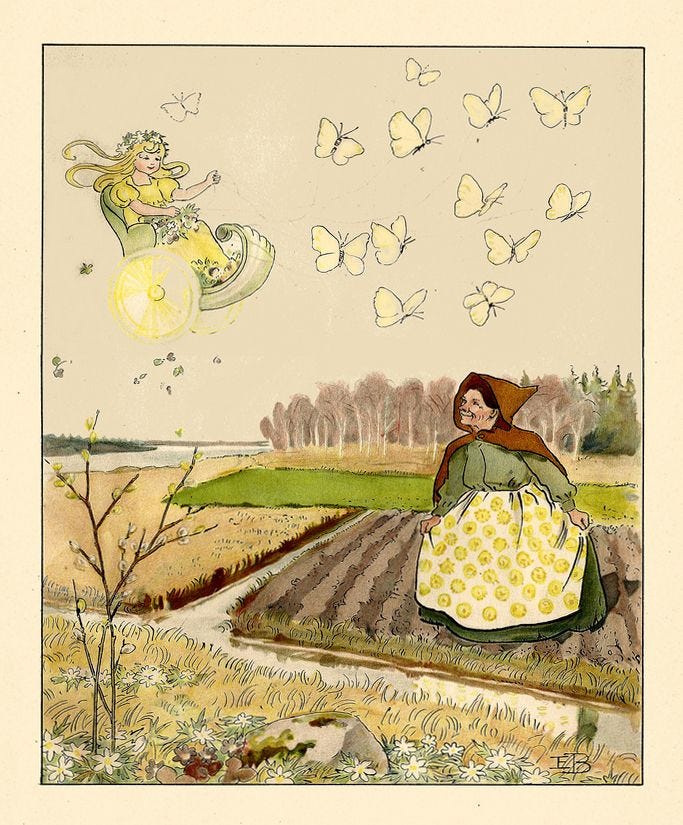Wilderment: Creative Writing in the Time of Climate Change
Spring's chariot, and an announcement about my next book
Dear friends near and far, I hope you are keeping well and keeping close with those you love. After an especially snowy winter here in North Carolina, the weather has warmed this week, and daffodils have just begun to bloom. My son Oliver has been spending afternoons in the backyard honing his outdoor skills. I bought him a wonderful book that I highly recommend for the exploration-loving kiddos in your life–Catch a Crayfish, Count the Stars by Steven Rinella–which is full of truly legit instructions for everything from tree climbing to shelter building to foraging to cleaning and cooking a fish. Inspired, Oliver has been practicing target shooting his blow gun (the darts are made from nails and are no joke), building shelters, making and decorating a walking stick, whittling, and identifying animal tracks down by the creek behind our house. On Monday, he and I made a good start on a teepee.

Spending a lot of afternoon and evening time outdoors has been a good antidote to the news this week, though I’m heartened to see the resistance to the current coup beginning to bloom all around us as well. For those of you looking for protests to join, check out this Facebook page, DC Protests Against the Trump Administration, which is a clearinghouse for protests in the DC area. In case any readers are near the capital or can get there easily, there is a 50501 March for Democracy scheduled for March 4. It also looks like a big Diversity, Equity, and Inclusion march is brewing for late August.
I imagine there are also local actions happening where you are, and I’d love hear about them—and other creative responses brewing in your communities—in the comments.
Announcing another Wilderment
For the past several months, I’ve been cooking up a proposal for a creative writing craft book currently titled Wilderment: Creative Writing in the Time of Climate Change, and I’m so pleased to report that I recently signed an advance contract for the book to be published by West Virginia University Press in their marvelous Salvaging the Anthropocene series. In the coming months, I will be turning as much of my attention as possible to writing this book, which will be (as far as I can tell) the first creative writing craft book for environmental/climate writing. As a result, I’ll be slightly decreasing my newsletter frequency to a minimum of one post per month rather than my usual two, and I appreciate your understanding (with special gratitude to the small group of you supporting my work with paid subscriptions!). I may often still write more here, but I want to give myself the flexibility and permission to channel the majority of my writing time toward book writing.
For a taste of what I’m attempting to do with this book, I’d like to share the overview of the project that I wrote for the book proposal, below. If any of you are aware of grants or other funding opportunities for writers, independent scholars, environmental humanities or arts, etc., that I might apply for to help support this project, could you please reach out and let me know?
Overview of Wilderment: Creative Writing in the Time of Climate Change
We live in bewildering times. With access to more information than ever before, the world and how to live in it has become neither clearer nor more comprehensible. The climate crisis is no longer a scientific projection, but a daily reality unfolding before our fearful and weary eyes. Yet, despite the clear and desperate calls for an end to fossil fuel extraction and a just transition to renewable energy and the protection of waters, forests, and other crucial habitats, we look around us and see a lot of what looks like “business as usual” as powerful political and corporate interests continue to distract from the crisis through denial and fabricated controversy.
For those of us who know and feel the great trouble we’ve gotten ourselves and the planet into, it can be challenging to know where to put our efforts amid the noise that all but envelops meaningful conversation about the life and health of the earth. This is not an accident: Fossil fuel companies have spent decades and heaps of money confusing the issue, causing citizens to feel powerless and stuck in endless debates about the relative value of “personal lifestyle change” versus system change, among other false binaries.
The fact remains that we are alive in a time in which great shifts in awareness, engagement, and community action are happening quickly alongside great leaps in renewable energy technologies. Some of these changes might have looked impossible or highly improbable even a few years ago. This transformative time is inspiring in many ways, with record numbers of people from diverse backgrounds and fields taking their place in the climate movement with innumerable successes, great and small. Yet, it remains true that no matter what we do at this point, the planet is in for a very tough road ahead. Great losses of species, habitats, and human life have already happened, are happening now, and will certainly increase before things could turn around on a large scale. Confronting this latter fact causes some of us to cling to a blindly optimistic trust in technology or other unforeseen saviors to swoop in and “save” us, or to become locked in pessimism and despair, throwing up our hands in the face of our predicament.
This is where writers come in. As John Keats famously pointed out in the 1817 letter to his two brothers in which he coined the term “negative capability,” which he defines as the ability of great literary writers to be “in uncertainties, mysteries, doubts without any irritable reaching after fact and reason,” writers and artists are known experts at being bewildered. The very nature of literature requires a mind and a heart comfortable with the discomfort of unknowing, of holding contradictory facts lightly and in one hand. It is our stock and trade, really—the navigation of simultaneous hope and despair, of beauty and ugliness. If we bring this capability to our engagement with the rapidly-warming earth, then surely we are uniquely qualified to remain fully present in this moment, as Donna Haraway urges in Staying with the Trouble, so that we might fulfill our task “to make trouble, to stir up potent response to devastating events, as well as to settle troubled waters and rebuild quiet places.”
Wilderment: Creative Writing in the Time of Climate Change is a call to creative writers of all experience levels and backgrounds to take their unique abilities and contributions to this moment seriously, use them with care and intention, and recognize their value. It investigates the role of literary writers at this moment, affirming literature and artmaking as valuable contributions to the planet’s passage through this mess to what may lie beyond. As an intervention in the field of environmental writing, this book offers the framework of “wilderment” as a provocation to embrace the bewilderment of these times through the thoughtful engagement of negative capability and “staying with the trouble” as well as to become wild ourselves, cultivating those parts of us that live in nuance and complexity, and that refute, question, challenge, and deepen existing beliefs and assumptions—especially our own. While political frameworks and affiliations, especially in the digital age, train us to “stay on message,” to repeat and repost, this book argues that the writer/artist must stay in close contact with dreams and shadows that may—rather than helping to deliver an approved message—further complicate matters as they expose the underlying fears and harms we’ve repressed, or identify the irreconcilable contradictions in our assumptions and ways of life.
As a practical guide for writers, Wilderment offers frameworks for the kinds of stories, literary strategies, and creative endeavors that may be particularly powerful in these times, examples of environmentally-engaged writers and works that dance beautifully in wilderment, and guidance for thinking beyond the page and into new communities and contexts. Unique among other writing guides and volumes on environmental literature or climate storytelling, this book also dedicates a chapter specifically to the subject of activism, both informing readers of current conversations and controversies around the term “activist” and providing direction for how writers might strengthen their role as changemakers in their communities. Further, each of the book’s eight chapters incorporates a series of “Invitations,” prompts for reflection and writing that support deeper engagement with the concepts therein. Both probing and expansive, these exercises are designed to trigger the inner as well as the relational conditions from which transformational art and action grow. These Invitations should be equally relevant for individuals reading the book independently, small groups working through it collectively, and instructors using it in a classroom context.
Finally, this book assumes the potency of art-as-cultural-intervention while also acknowledging that we can’t often predict what impact art or literature will have in the world. There will always be a large portion of mystery in the way that one’s writing comes to be what it is, as well as the impact it may have when it goes off into the world to marry itself to other’s minds and hearts. This book embraces that mystery while guiding readers into a deeper and more directed sense of purpose in this period of great challenge and opportunity.
With love, Sarah Rose






What an exciting project! I teach writing in an MFA program and am always piecing together short texts of this kind to offer students; I look forward to sharing your book with them.
Sarah Rose, How amazing that WVU Press is supporting your work, after WVU's knockdown last year of anything that hints at humanities/complexity. I'm so excited for you, but also worried for you. (Is this a sign of codependency? Ha. Or good instincts based on institutional double-speak?)
Re: speaking out against the current dismantling of democracy, in our area each week many people are meeting together, and the attendance is ever-greater, from my 1st meeting where 150 attended; to 253 the next week; to 350 the following week. We are now Mountaineers Indivisible and today we are giving Musk a pink slip in front of the Morgantown courthouse. I have found strength from being in the company of others who are furious about what is happening and can't stand to sit by. I hope this heartens you.
Meanwhile, at my farm I'm waiting for the kestrels to return. We've vented their nesting box and placed a temperature data logger inside.